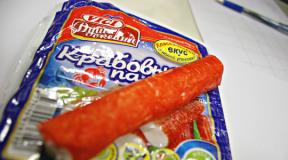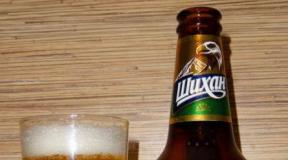The norms for the sale of alcoholic beverages. When you need to connect the system at a point of sale
From January 1, 2018, the sale of alcohol will be carried out within the framework of the EGAIS mechanism, which will automate the current accounting system. The authorities intend to reduce the scale of the "gray" market and increase the revenue side of the budget. The Ministry of Finance plans to legalize online alcohol trade, which will become a new driver of market growth.
Next year, entrepreneurs who sell alcohol are required to use EGAIS. This accounting system allows tracking the movement of products, which will become an operational tool for monitoring the actions of market participants.
Strengthening control over the alcohol market will have a positive effect on the quality of products, officials say. In addition, the authorities expect to inflict a crushing blow on the shadow market, which will significantly increase the revenue side of the budget.
Within the framework of EGAIS, all retail outlets must be equipped with special devices - scanners that read the necessary information placed on the label. At the same time, information online is fed into a single system, which allows you to control the legality of a trading operation. Also, an additional control tool will appear among ordinary consumers.
Among other things, the new rules for the sale of alcohol in 2018 will apply to entrepreneurs who sell beer. However, in this case, the legislative field allows for a simplified mechanism for accounting for products sold.
Business representatives who trade in beer are required to purchase a special key - JaCarta. With the help of this tool, the entrepreneur will be able to confirm the purchases of alcohol in the accounting system. Also, the individual entrepreneur will have to obtain a qualified electronic signature and keep a log book. Unlike the sale of strong alcohol, a beer outlet may not be equipped with a special scanner.
The sale of alcohol from January 1, 2018 through EGAIS creates additional opportunities for verifying the authenticity of the purchased products.
Towards transparency
With the help of EGAIS, consumers will be able to easily distinguish fake from genuine alcoholic beverages. Special software will allow you to quickly check the origin of the purchased products. Including all representatives of public catering who sell alcoholic beverages should switch to EGAIS.
Basic information for the consumer is displayed on the receipt: bottle number and a special two-dimensional code. The authenticity of the latter can be checked using the application installed on the smartphone. Thus, consumers will be able to verify the authenticity of products online.
The developers of EGAIS have provided options for the operation of the outlet if the Internet disappears. In this case, the information is recorded on a special drive, which will transmit information about all operations performed after the connection is restored. However, such operations can only be carried out within three days.
Trade in alcohol from January 1, 2018 without connecting to the accounting system will result in an impressive fine. Financial sanctions for violating companies reach 150-200 thousand rubles, while the head will have to pay 15 thousand rubles.

In addition to the accounting system, officials next year are proposing to legalize online alcohol trade. This issue continues to be discussed by representatives of the Ministry of Finance and the Ministry of Health, considering various aspects of online trading.
Online trading
The Ministry of Finance plans to legalize the sale of alcohol via the Internet, which will become a new driver for the development of distance selling. At the first stage, the department proposes to issue appropriate licenses only for manufacturers and companies that are engaged in wholesale trade. For retail and food service, licenses will become available from 2021.
The Ministry of Industry and Trade notes the significant potential for the development of alcohol trade via the Internet. According to the agency's estimates, more than 80% of requests for the purchase of alcoholic beverages by remote method fall on persons over 25 years old. At the same time, the risks from such trading will be minimal, since premium alcohol will most often be purchased on special occasions.
The solution to this issue continues to be discussed at the government level; the Ministry of Health and Rospotrebnadzor oppose the initiative of the Ministry of Finance. The Ministry of Health fears an increase in alcohol consumption, which will lead to a deterioration in the health of citizens.
The sale of alcohol next year will be carried out through the EGAIS. A unified accounting system will allow you to quickly monitor trade operations in the alcohol market and minimize the scale of sales of counterfeit alcohol. The sale of beer from January 1, 2018 will also be carried out through the Unified State Automated Information System, however, in this case, entrepreneurs will not be able to equip outlets with special scanners.
Another innovation that may take effect in 2018 is the sale of alcohol over the Internet. The government continues to discuss possible options for implementing this initiative.
Look video on the change in the procedure for the sale of alcohol from 2018:
Beer, as well as cider, Poiret, mead and other beer-based drinks are alcoholic products. When selling beer, it is necessary to take into account the norms governing the trade in alcohol, but with some peculiarities. Interested in this line of business? Then read our article, in it we will talk about the most important issues when trading beer and beer drinks:
- can an individual entrepreneur sell beer;
- do i need a license to sell beer;
- what are the restrictions on the sale of beer;
- whether beer sellers need to connect to EGAIS;
- when selling beer does not need a cash register;
- what OKVED codes to select for the sale of beer;
- what kind of reporting on the volume of sales must be submitted.
Can an individual entrepreneur start trading in beer
Let us answer right away that individual entrepreneurs have the right to sell beer. Why does this question arise at all? Are there any bans on the sale of alcohol related to the legal form of the seller (individual entrepreneur or LLC)? There really is such a prohibition, it is established by Article 16 of the Law of 22.11.1995 No. 171-FZ.
According to her, only organizations are allowed to sell strong alcohol. Why this is not explained, but the fact remains - only legal entities are entitled to trade in spirits and wines. An exception was made only for individual entrepreneurs - agricultural producers who sell wines and champagne of their own production.
Regarding the sale of beer, the same article states that "The retail sale of beer and beer drinks, cider, poiret, mead is carried out by organizations and individual entrepreneurs." Pay attention - it is retail sale! The fact is that there is also the norm of Article 11 of Law No. 171-FZ, and it allows the wholesale turnover of alcohol and beer also only to legal entities.
Thus, individual entrepreneurs have the right to sell beer and drinks based on it only at retail. And in order to produce and sell beer without restrictions, you need to register a company.
Do I need a license to trade beer
And here everything is simple - a license to sell beer is not required. Again we read Law No. 171-FZ, Article 18 on issuance: “… except for the production and circulation of beer and beer drinks, cider, Poiret, mead”. So, the sale of beer without a license in 2019 does not threaten anything, no sanctions are provided for this. True, certain restrictions and requirements for organizing the sale of beer still exist, and we will talk about them further.
Terms of sale of beer
This is perhaps the most important information that you should get acquainted with before organizing a beer trade. Given that beer is an alcoholic beverage, it is understandable that it should not be available anywhere and at any time.
Beer alcoholism develops quickly and imperceptibly, which is especially dangerous for children and women. And if for beer traders large sales volumes are profit, then buyers of a foamy drink pay for their excessive consumption with their health. It must be sympathetic to the prohibitions established in Article 16 of Law No. 171-FZ, and ultimately they act for the good of the whole society.
- children's, educational and medical institutions;
- sports and cultural facilities;
- public transport of all types and its stops;
- markets, train stations, airports and other places of mass gathering of citizens (with the exception of catering establishments);
- military facilities.
2. Beer can only be sold in stationary retail facilities, so the building must have a foundation and be entered in the real estate register. That is, such temporary structures as stalls and kiosks are not suitable for selling beer, with the exception of catering establishments. As for the area of a shopping facility, if, in addition to beer, strong alcohol is sold, then the following restriction applies:
- not less than 50 sq. m. in cities
- not less than 25 sq. m. in the countryside.
When trading only beer, there are no restrictions on the area.
3. Beer sale time is limited from 8 to 23 hours, except for catering outlets.
- the seller - from 30 to 50 thousand rubles;
- an official (individual entrepreneur or head of an organization) - from 100 to 200 thousand rubles;
- legal entity - from 300 to 500 thousand rubles;
If there is any doubt about the age of the buyer, the seller must request an identity document. In addition, criminal liability is possible for selling beer to minors. Be aware that police often carry out control raids involving young people in order to instigate this illegal sale. Better to play it safe and ask for a passport, even if the buyer looks old enough.
5.From January 1, 2017, the production and wholesale trade is prohibited, and from July 1, 2017 - the retail sale of beer bottled in plastic containers with a volume of more than 1.5 liters. Fines for violation: from 100 to 200 thousand rubles for individual entrepreneurs and from 300 to 500 thousand rubles for legal entities.
6. Additional restrictions on the sale of beer may be imposed by local authorities. So, in many municipalities, the sale of beer in retail outlets located in apartment buildings is prohibited. We recommend that before you start trading in beer, learn all the rules in the local administration or the Federal Tax Service Inspectorate.
EGAIS - beer sale
EGAIS is a state system for controlling the production and circulation of alcohol. Do you need EGAIS to sell beer? Yes, of course, but in a limited format. Organizations and individual entrepreneurs purchasing beer for further retail sale are obliged to connect to the system for years only to confirm purchases of bulk lots from legal producers and suppliers.
To connect to EGAIS, you need to obtain a special electronic signature and register on the official website of Rosalkogolregulirovanie. We described in detail how to do this. After registering in the system, the buyer receives his identification number (ID), and the supplier draws up invoices for him, reflecting them in the EGAIS. After the consignment of goods is accepted by the buyer, the supplier writes off the delivered products from their balances in the Unified State Automated Information System, and it is recorded for the buyer.
Confirmation of the fact of the sale of each bottle of beer, as is the case with strong alcohol and wine, is not required, therefore, trade in beer through EGAIS is easier than other alcoholic beverages. The main thing here is to confirm that the wholesale batch of beer was purchased legally.
Please note that trading in beer without a cash register is punishable separately under Article 14.5 of the Administrative Code of the Russian Federation:
- for individual entrepreneurs and heads of organizations - from ¼ to ½ of the calculation amount, but not less than 10,000 rubles;
- for organizations - from ¾ to the full amount of the calculation, but not less than 30,000 rubles.
New OKVED codes for beer trade
Please note that when registering an individual entrepreneur and LLC, only the classifier is used. Use the new 2019 OKVED codes to indicate activities related to the beer trade.
For wholesale trade in beer:
- 46.34.2: Wholesale trade of alcoholic beverages, including beer and edible ethyl alcohol;
- 46.34.23: Wholesale trade in beer;
- 46.17.23: Beer wholesaler agents.
For beer retail:
- 47.25.1: Retail sale of alcoholic beverages, including beer, in specialized stores;
- 47.25.12: Retail trade in beer in specialized stores.
- 47.11.2: Retail sale of unfrozen products, including drinks and tobacco products, in non-specialized stores;
For trade in beer in public catering:
- 56.30: Activities of bars, taverns, cocktail rooms, discos and dance floors (with a predominantly beverage service), beer bars, buffets, phyto bars, drinks vending machines.
Important: if you registered an individual entrepreneur or LLC before July 11, 2016, then you do not need to make any changes to the codes, the Federal Tax Service will independently correlate your old and new OKVED codes entered in the registers.
But if you decide to start selling beer after mid-2016, and the corresponding codes were not entered immediately upon registration, then you must inform about the new type of activity using the forms (for individual entrepreneurs) and P13001 or P14001 (). In this case, indicate the codes according to OKVED-2, as indicated above.
Reporting on the sale of beer
From January 1, 2016, sellers of alcoholic beverages, including beer, are required to keep a register of the volume of retail sales. The form of the journal and the procedure for filling it out are approved by Order of the Federal Alcohol Market Regulation dated June 19, 2015 No. 164.
The magazine must be filled in daily, no later than the next day after the sale of each container or package of alcohol, including beer. At the end of each day, fill in the sales data: name, product type code, volume and quantity. This is how a sample magazine looks like, posted on the website of the state organization FSUE "CenterInform", which issues an electronic signature for connecting to the EGAIS.

A fine is imposed for the absence of a magazine or its incorrect keeping - from 10 to 15 thousand rubles for individual entrepreneurs and from 150 to 200 thousand rubles for organizations.
In addition, at the end of each quarter, no later than the 20th day of the next month (April 20, July, October, January, respectively), it is necessary to submit to Rosalkogolregulirovanie a declaration on the turnover of beer in form No. 12. The declaration form and the rules for filling it out are approved by the Government decree of August 9, 2012 No. 815.
Let's summarize:
- Beer can be sold not only by organizations, but also by individual entrepreneurs, however, only retail trade for final consumption is allowed for them.
- No beer license required.
- Consider the legal restrictions on the place, time and circle of buyers when selling beer.
- It is impossible to legally purchase a batch of beer for further sale without connecting to the Unified State Automated Information System, so you need to register on the Rosalkogolregulirovanie website. After that, the system will have to confirm each time the purchase of the batch and reflect the remaining products.
- From March 31, 2017, the sale of beer, including in public catering, is possible only with the use of a cash register, regardless of the tax regime.
- Since July 11, 2016, only OKVED-2 has been applied for registration purposes. Indicate the OKVED codes for the sale of beer from our selection, they correspond to the current classifier.
- Keep a register for alcohol retail and submit beer sales declarations on time.
The law on the sale of alcohol, aka Federal Law of 22.11.1995 N 171-FZ, was adopted in Russia for a reason. Sadly, our country is in the top of the world rankings for alcohol consumption. It's no secret that alcoholism is one of the most important problems in our society, and various government officials also regularly focus on this.
One of the most effective levers to reduce the amount of alcohol consumed on average in the country is to restrict its sale at the legislative level. Due to the fact that such measures have already been taken, the question of when it is forbidden to sell alcohol is of interest to both those who sell it and those who plan to consume it. Of course, there is a special law on the sale of alcohol, but not everyone bothers to open it and understand everything. Below is all the information in a more accessible and understandable form.
The concept of "alcohol"
In order to correctly use and be guided by the law on the sale of alcohol, it is necessary to clearly understand what exactly falls under the concept of "alcoholic beverage". The law of interest to us is Federal Law of 22.11.1995 N 171-FZ. In fact, all drinks that contain 0.5% ethyl alcohol or its fermentation products are officially alcoholic - Art. 2 FZ-171. However, there is little revenue. This concept does not include all products in which the percentage of alcohol does not exceed 1.2%. For example, in such insignificant quantities, alcohol can be contained in fermented milk products (kefir, tan, kumis), as well as in kvass. It should be noted that some types of kvass contain even more alcohol than 1.2%, however, they are still not considered alcoholic beverages.
By product type
In addition, all products that are officially positioned as non-alcoholic and have been tested are not subject to the law on the sale of alcohol. The most common options are non-alcoholic beer and non-alcoholic wine. Ethanol is usually still present in them, but its share rarely exceeds half a percent, and therefore such drinks are not subject to the specified Federal Law.
The main list of alcoholic beverages is specified in the aforementioned federal law and other by-laws. To put it simply, any liquid that contains alcohol is officially within the scope of the law on the sale of alcohol. In particular:
- wine;
- liquor;
- port wine;
- whiskey;
- cognac;
- vodka;
- brandy;
- absinthe;
- tequila;
- Calvados;
- any alcohol tinctures;
- beer.
Beer
It is worth dwelling on beer separately. Many, for some reason, believe that beer is not subject to the law on the sale of alcohol due to its low alcohol content. The same is often thought of about various low-alcohol products, alcohol-based energy drinks, and so on. As a rule, the alcohol content in such drinks is at the level of 3-4% or even higher, so there is no reason to make an exception for them. From a legal point of view, it is the law under consideration that the sale of 3.5% beer is equivalent to the sale of 70% chacha. But you need to understand that there are exceptions for the sale of beer specified in other norms. Therefore, if you decide to go into retail trade in beer, study the legislation more carefully, in particular FZ-289.
Normative base
The law on the sale of alcohol, which, by the way, was amended in 2019 (entered into force on 06/08/2017), is the main normative act that regulates the sale of any alcoholic beverages.
One of the most important points of this law is the limitation of the age of persons to whom alcohol can be sold. In any instance, he is 18 years old. Exceptions are made only for those cases when a person officially married, or opened his own private enterprise. In such cases, he is officially considered an adult, and able to take responsibility for his actions. However, even in the case of presenting, for example, a marriage certificate, sellers in stores very often refuse to sell alcohol to the client.
Requirements for premises and documents
Another very interesting clause of the law is the limitation of the area of premises in which alcohol can be sold. The law banning the sale of alcohol prohibits the sale of alcoholic beverages in an institution whose area is less than 50 square meters. Outside the city limits, this limit is reduced to 25 square meters. This information is regulated by various articles of the law, but in fact, for understanding it is worthwhile to immediately study 278-FZ - it is in it that the main amendments concerning changes in part of the premises are spelled out.
It should be noted that there have always been enough people who want to bypass the law on the sale of alcohol in Russia. A common scheme is to try to buy alcohol over the Internet. At the same time, the courier brings to the client not only the drink directly, but also the lease agreement, which is a cover. According to this document, alcohol is allegedly transferred to a person for hire as a decorative element. At the same time, according to the agreement, the recipient does not have the right to damage or open it. Nevertheless, now this scheme is already being figured out without any problems by law enforcement officers. The lease agreement is recognized as being drawn up to conceal the actual purchase and sale agreement, after which the selling company is brought to justice. In some cases, even a buyer may be attracted if he was directly involved in the implementation of the scheme, fully aware of the fact that it is illegal.
Lawyer of the collegium of legal protection. He specializes in administrative and civil cases, compensation for damage by insurance companies, consumer protection, as well as cases related to the illegal demolition of shells and garages.
If you decide to start a restaurant business, or want to open a bar, grocery store, then alcohol trade can become a very profitable business. Unlike other items of income, income from the sale of alcoholic beverages, as a rule, always remains high. Some marketers joke that alcohol is best sold during a recession and crisis in the market, when people panic. The demand for alcoholic beverages does not subside. Analysts note that the alcoholic beverage industry remains the most profitable today. Moreover, not only the producers themselves, but also the retail and wholesale trade, receive not a bad income from the sale of alcohol. According to some forecasts, sales of alcoholic beverages will grow by 10% by 2014.
Obtaining a license
If the business is associated with the production, import, export or sale of alcoholic beverages and ethyl alcohol, then a license for the sale of alcohol is required, which gives the right to carry out one or another type of activity in the sale of alcoholic beverages.
The state strictly monitors the observance of mandatory rules when obtaining a permit - a license. In Russia, the production and distribution of alcoholic beverages is regulated by the state, since the consumption of alcohol is harmful to people's health, contributes to a decrease in the moral aspects of society, especially young people. The rules for obtaining a license for the retail sale of alcohol are legally regulated. To do this, you need to be registered as a legal entity with an authorized capital of at least 1 million rubles for one outlet, the sale of alcoholic beverages through one outlet for small businesses, 300,000 rubles, and for the sale of alcohol in public catering, 10,000 rubles. Federal self-government bodies issue permits to establish the boundaries of adjacent territories. The state sets a minimum price threshold below which the sale of alcohol-containing products is prohibited.
When obtaining a license for the retail trade of alcoholic beverages, it is necessary to submit to the licensing authority a package of documents that complies with the current legislation. This is a statement, with all the contact information and details of the organization, the type of activity and products that the legal entity will sell, as well as the license validity period, copies of all constituent and registration documents, as well as permitting documents from government agencies. For questions about obtaining a license to trade in alcohol due to changes in legislation, it is better to contact specialized companies that will provide qualified assistance, starting from the submission of documents to the moment of obtaining a permit.
Trading rules
Consider all the basic rules of the alcohol trade.
The law establishes a number of requirements for industrial premises and warehouses on the terms of ownership, the area of which in rural areas should be 25 square meters, and in urban areas - 50 square meters. Moreover, the lease must be drawn up for a period of one year or more. For the information of organizations selling alcoholic beverages, additional rules for retail trade have been established. First, the sale must be made in stationary retail outlets. Since the beginning of 2013, it has also been valid for the beer trade. In accordance with Article 5 of the Federal Law, the sale of alcohol from 11 pm to 8 am is prohibited. Retail sale of alcoholic beverages is not allowed in educational, medical, children's institutions, in transport and gas stations, in markets, airports and train stations, minors.
The Law on providing Rosstat with the necessary information on the volume of sales in a timely manner was canceled. Some of the norms and legislative acts established by the Law on state regulation of the production and circulation of ethyl alcohol, alcoholic and alcohol-containing products are outdated. Therefore, amendments were made, in particular to expand the concept of alcoholic beverages. Alcoholic beverages are considered alcoholic beverages, the content of ethyl alcohol in which is more than 0.5%. Changes have been made to the rules for the transportation, storage and storage of alcoholic beverages. According to the Federal Law, the transportation of alcohol is carried out with a license, regardless of the type of transport.
The sale of alcoholic beverages is allowed only to certain businesses that comply with certain conditions and requirements. To carry out this process, it is necessary to obtain a license, and the organization of the sale process itself must be carried out according to certain rules. If entrepreneurs violate the terms of the law, then severe penalties will be applied to them.
Legislative regulation
The process of selling alcohol is regulated by Federal Law No. 171, and numerous amendments are regularly made to it. At the beginning of 2018, sellers were notified of the tightening of the alcohol sales process. Changes concern not only trade establishments, but also manufacturers.
On January 1, 2018, a special grace period began, during which all producers and sellers of alcohol must make numerous adjustments to their business in order for it to comply with the requirements of the law. This delay lasts for six months, after which the organizations will be subjected to strict checks, the main purpose of which will be to identify violations. The law on the sale of alcoholic beverages provides that from July 1, 2018, various sanctions will be applied to violators.
Numerous changes will affect not only entrepreneurs, but also direct consumers. The main purpose of the amendments is to combat the illegal production of alcoholic beverages. Additionally, a transparent and understandable system will be created to control the production of alcohol and its sale. At the same time, an increase in the cost of production is expected, which will have a positive effect on the fight against alcoholism.
What additions have been introduced?
The changes apply to all citizens and companies specializing in the production or sale of alcoholic beverages. The sale of alcoholic beverages will be allowed from July only if there is a new business format.
The number of problems and worries will also increase for regulatory authorities, as they will have to regularly conduct inspections designed to determine whether numerous legal requirements are being complied with.
The main additions that were introduced in 2018 include:
- the sale of alcoholic beverages via the Internet is not allowed;
- the equipment used to create such drinks must be properly registered;
- individuals cannot transport in a car more than 5 liters of alcohol-containing products that do not have a label;
- due to the widespread introduction of the EGAIS system, reliable and effective protection against the sale of alcohol at the wrong time will be provided, and the receipt will also contain information about the brand of the purchased drink;
- the punishment applied to citizens or companies that violate the legislation in the field of production and sale of alcohol is significantly toughened, and not only significant fines are charged, but it is even possible to apply criminal liability for violators.
By changing the information in the law, amendments were introduced to the Administrative Code. Local authorities have the ability to supplement legislation, but only in the direction of tightening, not softening.

The nuances of selling on the Internet
Since the beginning of 2018, the sale of alcohol through various sites has been completely prohibited. This restriction on the sale of alcoholic beverages is due to the fact that citizens often buy such drinks at the wrong time. If the requirements of the law are violated, then the Code of Administrative Offenses provides for serious penalties:
- individuals pay a fine in the amount of 3 to 5 thousand rubles;
- for officials, a fine is imposed, ranging from 25 to 40 thousand rubles;
- companies will be required to pay from 100 to 300 thousand rubles.
Such tough measures will contribute to the fact that companies and citizens will really take a responsible approach to the requirements of Federal Law No. 149. On the basis of this law, the blocking of those sites on the pages of which advertising products containing alcohol is located is carried out. Due to this measure, it is planned that the amount of alcohol consumed by Russian citizens will be reduced.
Additionally, the Ministry of Finance is independently developing a special project on the basis of which the sale of alcohol via the Internet will be officially prohibited.
How to register equipment correctly?
The changes also affected the equipment designed for the creation of various alcoholic beverages. The sale of alcoholic beverages is permitted if these beverages are created on high-quality and properly registered equipment. If the use of illegal devices and units is revealed, then significant fines are imposed, and not only to companies, but also to individuals. The punishment is represented by large fines:
- for individuals - from 3 to 5 thousand rubles;
- for officials - from 20 to 50 thousand rubles;
- for companies - from 100 to 150 thousand rubles.
Additionally, significant fines are introduced for the use of pharmaceutical ethyl alcohol in the production process.

What are the restrictions on the rules of transportation?
In Art. 14.17 of the Administrative Code indicates that since the beginning of 2018, certain restrictions have been introduced in the process of transporting alcoholic beverages. Individuals cannot transport large quantities of unmarked alcohol in a car, and it does not matter where it was produced. For such a violation, a fine is imposed in the amount of 3 to 5 thousand rubles. Additionally, all products will be seized.
It is allowed to carry no more than 5 liters per person.
The nuances of introducing the EGAIS system
It is already in place in many trade organizations. The rules for the sale of alcoholic beverages are that such a system controls the possibility of selling alcohol at unauthorized periods of time. Additionally, it is guaranteed that there is no possibility that illegal alcohol will get into retail sale.
The EGAIS system makes it possible to create a single database that includes all types of alcohol. Each checkout will have a special scanner to control the sale of alcoholic beverages. He will be connected to this base via the Internet. When using this equipment, information is read from the excise stamp, and this information will additionally be duplicated on the check.
The indisputable advantage of such an organization of the sale of alcoholic beverages is that each customer can receive a lot of important data about the purchased drink.
Additionally, the possibility of introducing a special GOST for brandy is being developed, since the turnover of illegal cognac is considered too high. Based on the amendments, brands are allocated to a separate alcohol category. This will improve its quality, as well as simplify the process of work of regulatory bodies.

Increased punishment
Additionally, the changes affected the penalties for violation of the law. Even criminal liability is introduced for the sale of alcoholic beverages with violations. In addition to fines, arrests, involvement in community service, or even imprisonment for a fairly long period are now used. Two articles are introduced into the Criminal Code:
- Illegal alcohol production. If a substandard product is created using illegal methods, this will lead to serious penalties. They are represented by a fine of 2 to 3 million rubles, and forced labor for a period of 1 to 3 years is imposed. Additionally, imprisonment for up to three years can be applied. If a collective violation of the law is revealed at all, the fine is increased to 4 million rubles, and forced labor for up to 5 years or imprisonment for up to 5 years is imposed.
- Illegal sale of alcoholic beverages. Each company that sells such drinks must have a license to sell alcoholic beverages. For lack of permission, a fine is imposed in the amount of 50 to 80 thousand rubles. If the presence of counterfeit excise stamps is revealed, the fine is increased to 500 thousand rubles, and imprisonment for 8 years or forced labor can also be applied.
In addition, when determining a specific punishment, it is taken into account what kind of damage was caused. If the sale of alcoholic products to minors is carried out at all, then both the seller and the entire trade organization are punished.
Applying collective responsibility
The problem of young people getting drunk is considered the most acute for the state. It is assumed that children are primarily affected by older young people, so amendments will soon be adopted, on the basis of which not only sellers and trade organizations, but also parents will be held accountable.
The list will include citizens who, at the request of young people, buy them alcoholic beverages.

What days will alcohol not be sold?
Special days of sobriety have been introduced. This requirement for the sale of alcoholic beverages was supported by many regions, which, in turn, independently tightened such amendments, therefore, the number of days when citizens would not be able to buy alcohol was increased.
Alcoholic beverages are not sold on days:
- the last day of school work before summer holidays;
- when holding graduation balls;
- June 1, since this day is the day of protection of childhood;
- July 27 - Youth Day;
- September 1 - the first day of school;
- September 11 is the day of sobriety.
In addition, the regional authorities are significantly increasing the number of days when it is prohibited for various trade organizations to sell alcohol. Usually this includes any city holidays.
When is the sale of alcohol permitted?
Federal Law No. 171 additionally contains information about what time it is allowed to sell alcoholic beverages. These requirements remained unchanged in 2018, so sales of alcohol after 23:00 are not permitted. In many regions, this measure has been significantly tightened, so in some cities it will not be possible to purchase products after 22:00 or 21:00.
It is allowed to start selling only from 8:00, but in some cities this time is increased to 9:00 or 10:00. Regions can only lengthen a given period of time.

Age restrictions
Quite a long time ago, information appeared about the need to amend the legislation regarding the permissible age for the purchase of alcohol. Therefore, it is planned to change from 18 to 21 years of age.
The initiator of such a project is the Ministry of Health. But at the same time, the bill is still pending, therefore significant changes have not yet been introduced at the beginning of 2018.
Penalty for selling without a license
Every liquor company must pre-license this process. The exceptions are situations:
- sale of medical drugs containing alcohol;
- sale of products by an intermediary on behalf of a company that has a marketing authorization.
In other situations, a license is required to sell alcoholic beverages. If it is absent, then penalties are applied:
- officials pay a fine in the amount of 500 thousand rubles. up to 1 million rubles, and they will also be disqualified for a period of 2 to 3 years;
- companies pay a fine of 3 million rubles or more. up to 1/5 of the profit for a year of operation, all products are confiscated, and the activities of the enterprise can be suspended for a period of 60 to 90 days.

Thus, the sale of various alcoholic beverages should be carried out by companies only taking into account many legal requirements. If they are violated, significant penalties are applied to them. They can be represented not only by large fines, but also by arrest or suspension of activities. In 2018, significant changes were made to the legislation, therefore, the penalties were tightened. Also, companies that manufacture or sell spirits must completely re-format their business in order to legally continue to operate.



















